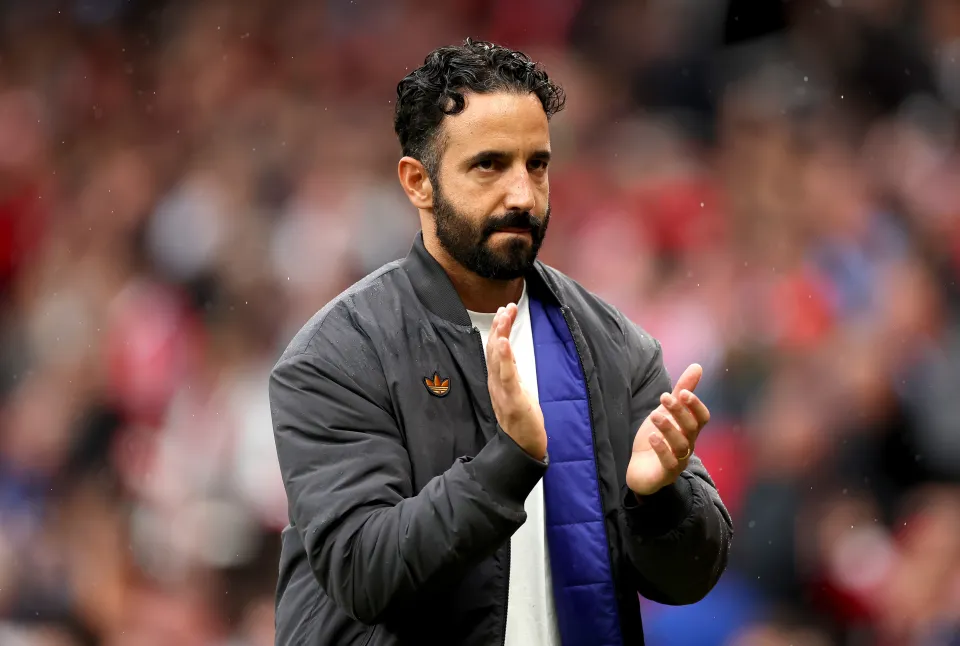Subtotal $0.00
Will Man United Sack Ruben Amorim? Grimsby Humiliation Leaves Red Devils Manager Under Huge Pressure
Manchester United were dealt a chastening blow that has intensified scrutiny around the dugout and raised questions about the club’s direction under manager Ruben Amorim. A defeat to Grimsby Town, a League Two underdog, did more than hand United a rare stumble in a run of fixtures. It rekindled the Ruben Amorim Sack debate and pushed a passionate fanbase to weigh the costs and benefits of continuity against urgency for change. In the immediate aftermath, the headlines spoke of a game that exposed fragilities at both ends of the pitch and, perhaps more tellingly, a leadership and tactical framework that looked misaligned with the energy shown by a spirited Grimsby side.
The shock result was not merely about a single match result; it was about how the team operates under pressure and how the club responds when the margins are thin and the scrutiny is unrelenting. Grimsby Town pressed with purpose, moved the ball quickly, and exploited gaps that United players seemed hesitant to close. The outcome has magnified a broader concern among supporters and pundits: can Amorim recalibrate the side quickly enough to avert a deeper malaise, or is this a sign that a change in leadership at Old Trafford is inevitable? The focus has shifted from talent acquisition to a deeper conversation about culture, balance in midfield, and the ability to impose authority on teams that have less name recognition but more intent and discipline on the night.
For those tracking the Ruben Amorim Sack debate, the club’s track record on patience with new managers provides historical context. Manchester United have often preached patience when a new blueprint is in its infancy, but results like the Grimsby clash sharpen the debate about whether patience is a virtue or a luxury in a club that demands regular trophies and European relevance. The practical question now is how United respond in the next fixtures. Will Amorim adjust the formation and personnel to extract more balance and cohesion, or will club chiefs feel compelled to consider a more dramatic pivot to protect the club’s credibility and momentum in the short term?
Grimsby’s Performance and the Wake-Up Call
The Grimsby Town performance was a reminder that football remains a game of momentum, pressure, and connection between the back line and the attack. Grimsby played with optimism and discipline, and they did not shrink when United sought control. The underdog’s approach—compact defense when needed, quick transitions, and a willingness to press the ball carrier—exposed vulnerabilities within United’s approach. In several sequences, Grimsby bypassed United’s midfield press with quick switches of play and precise runs in behind the last line. When Grimsby took the lead or created chances, their players carried a quiet confidence, signaling that preparation and belief can close the gap with bigger clubs on a given night.
From a tactical perspective, the encounter raised specific concerns about the balance in Amorim’s system. Questions emerged about the midfield’s ability to control tempo and disrupt opponent transitions, as well as whether the attack had enough emerging threat to stretch organized defensive blocks. In matches like this, the margin between a calculated, patient build-up and an overreliance on individual moments becomes stark. The Grimsby result intensified the sense that United’s personnel decisions need to reflect the level of competition in the Premier League and beyond, especially when confronted by teams that approach games as a test of collective grit as much as technical skill.
The Ruben Amorim Sack Debate: Arguments For and Against
The Ruben Amorim Sack chatter has long hovered on the boundary of realism and sentiment. On one side, supporters argue that a second-year manager needs time to implement a distinct philosophy, recruit players who fit the blueprint, and learn how to navigate a congested fixture schedule. The counterpoint is equally compelling: in a club of United’s stature, progress is measured in units of momentum and silverware, not in the development arc alone. Critics who call for change point to a trend of inconsistent performances, a lack of clear attacking threat in key moments, and a squad that sometimes appears uneven when tested by resolute opposition defences. They argue that leadership at the top of the pitch, and at the helm of the coaching staff, should evolve quickly to deliver results that match the club’s ambitions and the expectations of an impatient fanbase.
Proponents of patience insist that sacking a manager in a period of disruption can create more instability and jeopardize long-term plans. They propose that the focus should be on tactical tweaks, personnel adjustments, and reinforcing the squad to fit a cohesive system rather than chasing a quick fix. In this view, the Ruben Amorim Sack debate becomes less about an individual and more about whether the current setup can be trusted to develop into a competitive, all-season model. The challenge for United’s hierarchy is to balance the urgency of results with the prudence of a well-planned transition if it comes to that point.
What Could United Do Next: Tactical Tweaks or Personnel Moves?
In the immediate aftermath of a setback of this magnitude, the instinctual questions for any club are about the balance between making changes and preserving a broader strategic plan. For Manchester United, several plausible paths emerge as the club weighs next steps. The most conservative route remains disciplined evaluation: keep Amorim in place while undertaking a targeted review of squad fit, particularly in midfield and attack. This approach would emphasize adjustments in role clarity, pressing intensity, and the clinical edge in front of goal, with a view toward stabilizing results while maintaining a longer-term project.
However, the more radical option—sidelining Amorim in favor of an interim or permanent successor—looms as a conceivable, if controversial, alternative should results deteriorate further. The decision would be shaped not only by the Grimsby setback but also by the broader context of results across competitions, the health of the squad, and the availability of suitable candidates who can deliver immediate impact without derailing the club’s strategic plan.
From a tactical standpoint, there are several specific adjustments that could be explored under Amorim or a new interim coach. These include alternative midfield pairings to improve ball progression and pressing transitions, changes to attacking structure to increase goal production from varied channels, and a refined approach to defensive organization that minimizes lapses during quick transitions. A more compact shape with a plan to accelerate counter-attacks through quick vertical passes could also be part of a revised blueprint aimed at maximizing the squad’s qualitative strengths while mitigating recurrent vulnerabilities.
Potential Replacements or Interim Solutions
The rumor mill typically accelerates after a defeat of this gravity, and the Ruben Amorim Sack debate invites speculation about potential successors. While the club would weigh candidates carefully, it helps to consider the types of profiles that could be compatible with United’s culture, expectations, and ongoing project. Possible trajectories include:
- Promoting an interim coach with a proven track record of stabilizing teams and implementing a clear system quickly
- Targeting a high-profile manager with experience in balancing domestic duties and European competition
- Seeking a long-term architectural shift with a coach who aligns with the club’s strategic philosophy and youth development ethos
- Exploring a hybrid approach where an experienced advisor contributes to strategy while a head coach handles day-to-day management
- Considering internal candidates who understand the club’s culture and can bridge the transition with continuity
Any decision will be framed by the club’s broader ambitions, the willingness of players to adapt to evolving methods, and the external market’s readiness to supply suitable candidates who can step into a high-pressure environment. The Ruben Amorim Sack question, at its core, is not just about one person but about whether the club’s leadership believes in the current plan enough to see it through or if a decisive pivot is required to preserve momentum and morale.
Patience, Credibility, and the Balance of Risk
United’s decision-makers face a delicate balancing act between patience and credibility. The Grimsby clash could be the tipping point for a broader assessment of the project, or it could serve as a steep learning moment that strengthens the plan. Fans and stakeholders will be watching closely for signs of decisive action or measured evolution. The right decision depends on how the club interprets a confluence of indicators, including performance data, injuries, squad depth, and the competitive landscape of the Premier League and domestic cups.
Looking Ahead: What Fans Should Watch For in the Next Fixtures
As United prepare to respond, a few barometers will help determine whether the Ruben Amorim Sack chatter gains or loses momentum. First, how well the team translates training-ground ideas into match-day execution will be crucial. Are players executing pressing patterns, maintaining shape, and converting chances with increased frequency? Second, the return of any injured or underperforming personnel and how effectively they integrate into the system will shape results. Third, the club’s public messaging and internal communication will reveal whether leadership believes in a stable path or signals a readiness to pivot quickly.
Fans will also be scrutinizing the club’s transfer activity and contract situations. While buying and selling players is not a direct substitute for on-field performance, it signals intent and can influence the atmosphere around the squad. If the Ruben Amorim Sack debate gains traction, the window of opportunity to demonstrate a clear plan may become narrower, making timely decisions all the more important. In this tense atmosphere, every goal, defensive stop, and tactical adjustment could be read as a data point contributing to the broader assessment of whether Amorim can guide United back toward the summit of English football and meaningful European contention.
Conclusion
The Grimsby humiliation has reframed the conversation around Manchester United and Ruben Amorim in a way that few games could. It forced fans, pundits, and club insiders to confront the possibility that a leadership and tactical recalibration may be necessary sooner rather than later. The Ruben Amorim Sack debate is unlikely to end in a single match or a single decision; rather, it will unfold over weeks of fixtures, training sessions, and quieter moments of introspection at Carrington and on the touchlines on matchdays.
Whether United choose to stand by Amorim and reframe the plan with sharper execution or decide to pivot toward a new leadership structure, the one certainty is that the pressure will continue to build. Old Trafford demands results, but it also demands a clear, coherent project that can deliver sustained success. The coming weeks will reveal whether the club can reconcile ambition with stability and restore momentum after a night that will long be remembered for its unexpected sting and the urgent questions it posed about the direction of Manchester United.
















